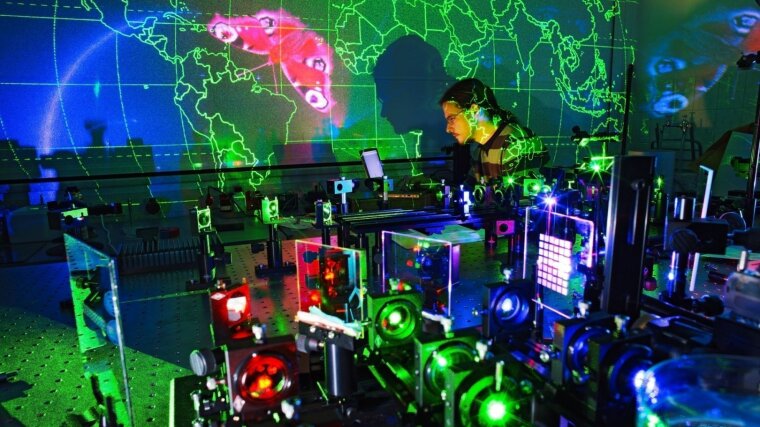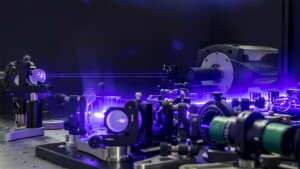
Prof. Dr. Andreas Tünnermann
Image: Anne Günther (University of Jena)Prof. Dr. Andreas TÜNNERMANN
Email: andreas.tuennermann@uni-jena.de
Phone: +49 3641-9-47800
Prof. Andreas Tünnermann is the director of the Institute of Applied Physics, and the Fraunhofer Inistute of Applied Optics and Precision Engineering (IOF). He is a member of the board of directors of the Abbe Center of Photonics. Andreas Tünnermann has been distinguished with many prizes and awards, e.g. with an European Research Council (ERC) Advanced Grant for boosting novel concepts of fiber lasers in 2015. Since 2019, he is the spokesperson of the national Max Planck School of Photonics.
The groups lead Andreas Tünnermann conduct application-oriented research in the field of optical systems engineering on behalf of publicly and industry-funded collaborative projects. The objective is to develop innovative optical systems to control light, from its generation to its application, in the cutting-edge fields of energy, environment, information, communication, healthcare, medical technology, safety, and mobility. To achieve these goals, the entire process chain, from the system design to the manufacture of prototype optical, opto-mechanical, and opto-electronic systems, is charted.
Research Areas
Andreas Tünnermann is leading one of the most creative research groups in modern optics and photonics world-wide. His main research interests include scientific and technological aspects associated with the tailoring of light. Research topics are the design and manufacturing of novel photonic devices and their application for light generation, amplification, guiding and switching, including:
- Functional optical surfaces and coatings
- Micro-, nano- and quantum optics
- Optical fibers, waveguides, and fiber lasers
- Imaging and projection systems
Teaching Fields
Prof. Tünnermann teaches students in the courses B.Sc. Physics, M.Sc. Physics and M.Sc. Photonics. He offers lectures in:
- Atomic and molecular physics
- Laser and ultra-short physics
- Structure of matter
Research Methods
The laboratories of the Institute of Applied Physics and of the Fraunhofer IOF offer world-unique facilities, including the following to name only a few:
- 1,115 m2 class 10,000 to 10 clean room area
- Electron beam lithography (Vistec SB350) and related nanostructure technology
- Ultra-precise diamond tools for 3D pattern generation
- Glass chemistry and fiber drawing tower
Quantum-based table-top demonstrator for cryptographically secure communication.
Image: Fraunhofer IOFRecent Research Results
The Institute of Applied Physics headed by Andreas Tünnermann carries out fundamental and applied research in the fields of micro-, nano- and quantum optics, as well as fiber- and waveguide engineering. It develops novel optical materials, elements and concepts for information and communication technology, process technology, life science and medicine, environment and enery, as well as material processing and optical measurement techniques.
Current research topics - dealt with by over 150 scientists - concern function, design and fabrication of micro-and nanooptical elements. Those are e.g. resonant nanometric structures, polarizers from IP to DUV range, 3D nano-structuring of crystals with ion beam and Atomic Layer Deposition of optical coatings. Also, light propagation and nonlinear light-matter interaction in e.g. photonic nanomaterials, including metamaterials, photonic crystals, as well as effective media, quantum phenomena and integrated quantum optics, application of photonic nanomaterials and advanced photonic concepts for astronomical instruments are investigated. Further research fields are the applications of femtosecond laser pulses, such as material processing and spectroscopic analyses, as well as micro- and nanostructuring, medical (laser) application and additive manufacturing usage of ultrashort laser pulses. For further aims, new concepts for solid-state lasers with focus on fiber laser technology are to be developed.
In addition, the employees of the Fraunhofer Institute for Applied Optics and Precision Engineering IOF conduct application-oriented research in the field of optical system technology for industry and as part of publicly funded joint projects. The various work groups represent the entire process chain from system design to the production of prototypes for optical, optomechanical and opto-electronic systems. Close cooperation with the Institute for Applied Physics within the Center of excellence in Photonics is of strategic importance in scientific projects as well as in training young scientists.
link to the Institute of Applied Physics
link to the Fraunhofer Institute of Applied Optics and Precision EngineeringExternal link

